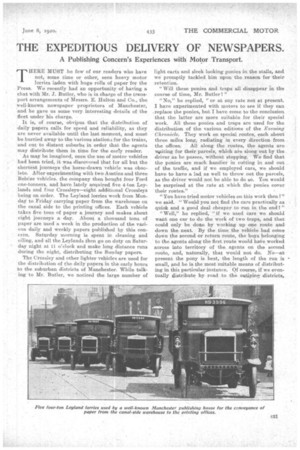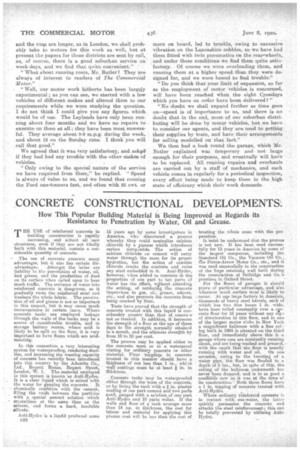THE EXPEDITIOUS DELIVERY OF NEWSPAPERS.
Page 19

Page 20

If you've noticed an error in this article please click here to report it so we can fix it.
A Publishing Concern's Experiences with Motor Transport.
TI-IERE MUST be few of our readers who have not, some time or other, seen heavy motor lorries laden with huge rolls of paper for the Press. We recently had an opportunity of having a chat with Mr. J. Butler, who is in charge of the transport arrangements of Messrs. E. Hutton and Co., the well-known newspaper proprietors of Manchester, and he gave us some very interesting details of the fleet under his charge.
It is, of course, obvipus that the distribution of daily Papers calls for speed and reliability, as they are never available until the last moment, and must be hurried away to the Various station.L for the trains, and out to distant suburbs in order that the -agents may distribute them in time for the early reader.
As may be imagined, once the use of motor vehicles bad been tried, it was discovered that for all but the shorte-st journeys the horse-drawn vehicle was obsolete,. After experimenting with two Austins and. three Belsize vehicles, the company then bought four Ford ene-tonners, and have lately acquired five 4-ton Leylands and four Crossleys—eight additional CrossIeys being on order, The Leyland lorries work from Monday toto Friday-.carrying paper from the warehouse on the canal side to the printing offices. Each vehicle takes five tons of paper a journey and makes about eight journeys a day. About a thousand tons of paper are used a week in the production of the various daily and weekly papers published! by this concern. Satnrday morning is spent in cleaning and oiling, and all the Leylands then go on duty on Saturdaynight at 11 o'clock and make long distance runs during the night, distributing the Sunday papers.
The Crossley and other lighter vehicles are used for the distribution of the daily papers in the early hours to the suburban districts of Manchester. While talk' ing -to Mr. Butler, we noticed the large number of light carts and sleek looking ponies in the stalls, and we promptly tackled him upon the reason for their retention.
"Will these ponies and traps all disappear in the course of time, Mr. Butler? "
"No," he replied, "or at any rate not at present. I have experimented with motors to see if they can replace the ponies, but I have come. to-the conclusion that the latter are more suitable for their special work. All these ponies and traps are used for the distribution of the various editions of the Evening Chronicle. They work on special routes, each about three mites long, radiating in every direction from the offices. All along the routes, the agents are wfiting for their parcels, which are slung out by the driver as he passes, without stopping. We find that the ponies are much handier in cutting in and' out of the traffic, and if we employed cars, we shoUld have to have a lad as well to throw out the parcels, • a-s the driver would not be able to do so. You would be surprised at the rate at which the ponies covet' their routes." .
"You have tried motor vehicles on thi& work then?" we said. "Would you not find the cars practically as quick and a good deal cheaper to run in the end? "
"Well," he replied, " if we used cars we should want one car to do the work of two traps, and that could only be done by working up one route and down the next. By the time the vehicle had came down the second or return route, the bays belonging to the agents along the first route would have worked across into territory of the agents on the second route, and, naturally, that would not do. No—at present the pony is best, the length of the run is small, and he is the most suitable means of distributing in this particular instance. Of course, if we eventually distribute by road to the' outlyine; districts, and the rims are longer, as in London, we shall probably take to motors for this work as well, but at present the papers for those districts are sent by rail, as, of course, there is a good suburban service on week-days, and we find that quite_ convenient."
" What about running costs, Mr. Butler They are always of interest to readers of The Commercial Motor."
"Well, our motor work hitherto has been largejy experimental; as you can see, we started with a few vehicles of different makes and altered them to our requirements while we were studying the question. I do not think I could give you any figures which would be of use. The Leylands have only been running about four months and we have no repairs to execute on them at all; they have been most successful. They average about. 8-9 m.p.g. during the week, and about. 12 on the Sunday runs. I think you will call that good."
We agreed that A was very satisfactory, and askceli if they had had any trouble with the other makes of vehicles.
"Only owing to the special nature of the service we have required from them," he replied. "Speed is always of value to us, and we found that running the Ford 'one-tenners fast, and often with 25 cwt. or more on board, led to trouble, owing to excessive vibration on the Lancashire cobbles, so we have had them fitted wikli twin pneumatics on the reaiewheels, and under these conditions we find them quite satisfactory. • Of course we were overloading them, and running them at a higher speed than they were designed for, and we were bound to find trouble."
"Do you think that your limit of expansion, so far as the employment of motor vehicles is concerned, will have been reached when the eight Ceossleye which you have on order have been delivered2" "No doubt we shall expand further as time goes on—speed is of importance to us, and there is no doubt that in the end, most of our suburban distributing will be done by motelvehicles, but we have to consider our agents, and they are used. to getting their supplies by train, and have their arrangements for selling modelled on' that 'fact."
Wo then had a look round the garage, which Mr. Butler explained was temporary and not largo enough for their purposes, and eventually will have to be replaced. All rtinning repairs and overhauls are carried out by a staff of mechanics, and each vehicle comes in regularly for a periodical inspection, every effort being made to keep them in the high state Of efficiency which their work demands.




























